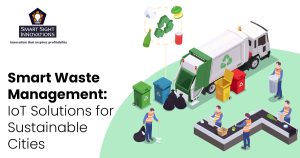 In an increasingly urbanized world, the efficient management of waste has become a critical challenge for local authorities. Traditional waste management systems often struggle to keep up with the growing urban populations, leading to inefficiencies, increased environmental impact, and mounting costs. However, the integration of Internet of Things (IoT) technology is revolutionizing waste management in cities, offering a path toward sustainable, clean, and efficient urban environments.
In an increasingly urbanized world, the efficient management of waste has become a critical challenge for local authorities. Traditional waste management systems often struggle to keep up with the growing urban populations, leading to inefficiencies, increased environmental impact, and mounting costs. However, the integration of Internet of Things (IoT) technology is revolutionizing waste management in cities, offering a path toward sustainable, clean, and efficient urban environments.
This article delves into some of the challenges with traditional waste management systems and highlights how utilizing IoT in streamlining these systems is the way forward.
The Challenges of Traditional Waste Management
Traditional waste management systems are hampered by several issues, some of which are:
-
Inefficiencies in Collection and Disposal
One of the foremost challenges of traditional waste management systems is the inherent inefficiency in waste collection and disposal. These systems typically rely on predetermined schedules and routes for waste collection, regardless of the actual fill levels of waste bins and containers. This inefficiency leads to overfilled bins, missed collections, and higher operational costs.
Consequently, municipalities spend more on fuel and labor, and the problem is exacerbated by the environmental consequences of the excessive carbon emissions from waste collection vehicles.
-
Lack of Data-Driven Decision-Making
Traditional waste management systems operate with limited access to real-time data. They lack insights into waste generation patterns and the immediate needs of waste collection. Without accurate and up-to-the-minute information, municipalities struggle to optimize their resources effectively.
This lack of data-driven decision-making results in inefficient resource allocation, wastage of resources, and operational costs that could otherwise be reduced significantly.
-
Growing Urban Populations
Urbanization is a global trend, and as the world’s population continues to shift toward urban areas, the amount of waste generated by cities is on the rise. Traditional waste management systems, which were designed for a different era, often struggle to cope with the surges in waste volumes. They were not designed to handle the ever-increasing quantities of waste produced by growing urban populations, leading to overburdened infrastructure and a subsequent increase in waste-related issues, such as overflowed bins, littering, and inefficient waste collection.
-
Environmental Impact
Perhaps one of the most concerning challenges of traditional waste management is its adverse environmental impact. Landfills, which are a primary disposal method in many areas, produce harmful greenhouse gasses like methane that contribute to climate change.
Inefficient waste collection also results in excessive fuel consumption and, consequently, higher emissions. This environmentally unsustainable approach negatively affects the overall health of the planet.
-
Public Health Concerns
Inefficient waste management practices can pose significant public health risks. Overflowing bins and waste littered on the streets can attract pests and spread diseases. Inadequate waste collection can lead to contaminated water sources and outbreaks of diseases in densely populated urban areas, further underlining the importance of efficient and reliable waste management systems.
-
Economic Implications
Traditional waste management systems can have a substantial economic impact on municipalities. Operational inefficiencies lead to higher fuel costs, excessive labor expenses, and additional maintenance requirements. Over time, these costs add up, straining municipal budgets and reducing the funds available for other essential services and infrastructure projects.
IoT Technology in Smart Waste Management
Smart waste management is an innovative and technology-driven approach to the collection, monitoring, and efficient handling of waste in urban environments. It leverages advanced technologies, particularly the IoT, to optimize waste collection and disposal processes.
The IoT network of interconnected devices and sensors that collect and transmit data is proving to be a game-changer in waste management, offering a range of solutions to tackle the challenges posed by traditional systems.
How Is IoT Transforming Waste Management
The integration of IoT technology into waste management systems brings forth a multitude of benefits, transforming the way cities handle their waste. It extends far beyond operational efficiency and delivers a wide array of environmental and social benefits too, profoundly impacting urban environments and community engagement.
1. Smart Bins and Containers
IoT-enabled waste bins and containers are equipped with sensors that monitor fill levels, temperature, and other factors. When a bin reaches a predefined threshold, it triggers an automatic alert to waste management personnel, ensuring timely collection.
2. Real-time Monitoring
IoT sensors provide continuous, real-time monitoring of waste levels, enabling waste management teams to optimize collection routes and schedules. This not only reduces operational costs but also minimizes fuel consumption and emissions.
3. Predictive Analytics
IoT systems use historical data and machine learning algorithms to predict future waste generation patterns. This allows for proactive waste management, ensuring that bins are emptied before they overflow.
4. Improved Efficiency and Cost Reduction
Real-time data and predictive analytics help cities optimize waste collection routes and schedules, reducing fuel consumption and operational costs.
5. Reduced Pollution and Emissions
One of the most immediate and significant environmental advantages of IoT in waste management is the reduction in pollution and emissions. As IoT technology enables real-time monitoring and data-driven decision-making, the optimization reduces the carbon footprint of waste management operations, contributing to cleaner air and a healthier urban environment. Fewer emissions also align with sustainability goals and climate action initiatives, fostering a more environmentally responsible city.
6. Community Engagement
With the help of real-time data on waste generation and collection, citizens become more informed and involved in the process, resulting in a sense of shared responsibility. When residents can check the fill levels of nearby bins through apps or receive alerts about scheduled collections, they are more likely to actively participate in reducing waste. This collaborative effort not only reduces the waste generated but also fosters a sense of community and shared environmental stewardship.
7. Sustainable Urban Development
Smart waste management is an essential component of sustainable urban development. Efficient and effective waste management contributes to a city’s overall environmental sustainability.
Reduced pollution, lowered emissions, and engaged communities result in urban environments that are cleaner, more livable, and environmentally responsible. These factors enhance the quality of life for residents and support a city’s attractiveness as a place to live, work, and invest in.
Realizing IoTs Impact: Case Studies in Smart Waste Management
1. Barcelona, Spain
Barcelona is often cited as a pioneer in smart city initiatives, and its approach to waste management is no exception. The city introduced smart waste bins equipped with fill-level sensors, GPS, and communication technology. These bins send real-time data to waste collection trucks, enabling them to optimize routes and pick up only the bins that are full. This IoT-based system has reduced collection costs by 30% and lowered CO2 emissions.
2. San Francisco, USA
San Francisco has been at the forefront of waste diversion and recycling efforts. To further enhance these initiatives, the San Francisco Smart Waste Management Project introduced more than 1000 IoT sensors in waste bins across the city.
Smart bins with fill-level sensors were deployed throughout the city. These bins not only optimized collection routes but also helped the city monitor waste patterns, enabling better waste management strategies and reducing the number of overflowing bins.
3. Singapore
Singapore is known for its impeccable cleanliness, and IoT plays a pivotal role in maintaining this status. The city-state employs an advanced waste collection system featuring sensors that detect bin fill levels and even odors. These sensors enable real-time tracking, which is essential in a dense urban environment like Singapore. By minimizing unnecessary trips and emptying bins only when needed, the city has achieved a significant reduction in operational costs and environmental impact.
4. Stockholm, Sweden
Stockholm is another city that demonstrates the potential of IoT in waste management. The city uses IoT technology to optimize the collection process for its underground vacuum waste system. This system transports waste from residential buildings directly to waste facilities, eliminating the need for traditional garbage trucks. The result is a cleaner city, reduced traffic congestion, and a more sustainable waste management system.
5. Amsterdam, Netherlands
Amsterdam has embraced the circular economy concept, and its waste management approach reflects this commitment. The city implemented IoT-enabled smart bins that not only monitor waste levels but also separate recyclables from non-recyclables. This innovation helps reduce contamination and promotes recycling, aligning with Amsterdam’s sustainability goals.
6. Seoul, South Korea
Seoul has taken a comprehensive approach to waste management by implementing RFID (Radio-Frequency Identification) technology on waste bins. This allows the city to track individual households’ waste generation and charge residents accordingly. Seoul’s system incentivizes residents to reduce waste production, as they pay for the amount they dispose of. This not only reduces waste but also fosters a sense of responsibility among residents.
Policy and Regulatory Considerations
Effective policies and regulations are crucial to encourage the adoption of IoT-based waste management systems.
-
Government Initiatives and Incentives
Governments at various levels can support the implementation of IoT waste management by offering incentives and regulatory frameworks that promote sustainability and innovation.
-
Waste Management Regulations
Regulations related to waste management may need to be adapted to accommodate the integration of IoT technology and to ensure data security and privacy.
-
International Standards
The establishment of international standards for IoT-based waste management can help create a unified approach to this technology and ensure interoperability between systems.
Future Trends and Innovations
The evolution of IoT technology in waste management is ongoing, with several future trends and innovations to watch out for.
-
Integration with Smart City Initiatives
IoT-based waste management is becoming an integral part of broader smart city initiatives. By integrating waste management into the smart city ecosystem, cities can achieve more efficient resource allocation and sustainability goals.
-
Machine Learning and AI in Waste Management
The integration of machine learning and artificial intelligence in waste management will further enhance predictive analytics, allowing cities to make more accurate forecasts and optimize collection routes.
-
Waste-to-Energy Technologies
As the focus on sustainable energy sources grows, waste-to-energy technologies will play a more prominent role in waste management. These technologies convert waste into energy, reducing landfill usage and greenhouse gas emissions.












